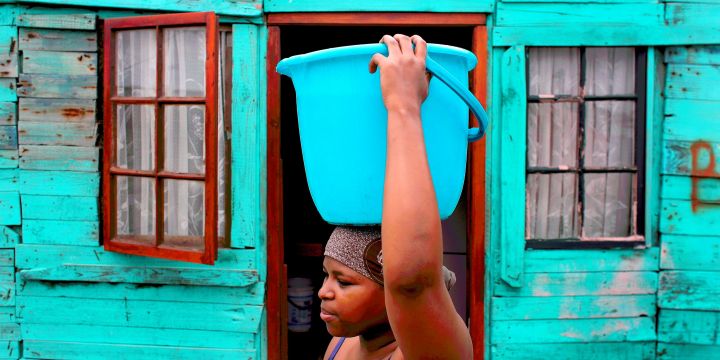ON THE CRISIS FRONT LINE
Frequent climate crises widen gender inequality gap and erode human rights progress

Increasing and more intense climate crisis events are worsening the gender inequality gap, particularly for those on the front line of the crisis: Women and girls whose human rights are exchanged for the survival of their families.
‘There is no climate justice without gender justice,” Ugandan climate activist Vanessa Nakate has said.
This rings especially true for young women and girls in climate-vulnerable regions that experience compounded climate events and have their human rights exchanged for the basic needs of their families.
Hanadi Yusuf Dawud, a 25-year-old gender equality advocate and psychologist in Ethiopia – where conflict and climate change have escalated the effects of internal fighting – told Daily Maverick that during natural and human-made disasters, the most vulnerable people were women and girls.
“More than 600,000 students have dropped out of school and they’re staying home, which has increased gender-based violence in many ways. Women travel long distances to fetch water and along the way, they get raped and assaulted. And the children who stay at home, people know that they are home alone and they get raped by strangers and family members,” said Dawud.
Read More on Daily Maverick: Women farmers on the frontlines of the climate crisis demand recognition and support
“Homelessness among children has also increased. Children get raped while trekking for a bottle of water,” said Dawud, adding that the number of child brides had increased significantly since 2022 as drought and conflict continued.
According to Unicef, the United Nations Children’s Fund, child marriage increased by an average of 119% across Ethiopia’s Somali Region, Oromia, and the Southern Nations, Nationalities and People’s Region between January and April 2021 and during the same period in 2022.
Millions of people were displaced during the Ethiopian government’s two-year war with the Tigray People’s Liberation Front, which ended with a peace agreement in November 2023. Smaller wars over land and identity continue to be fought across the country.
Child brides are often married off to much older men in exchange for a dowry that will carry the family through periods of climate-induced droughts, or in exchange for cattle to feed the family, Dawud said.
The gender equality activist said that having one less child to feed in the household made matters less stressful for families enduring prolonged droughts.
Dawud said that the current situation made it difficult for professionals such as herself to intervene when matters of life and death – as a result of starvation – were on the table; especially when aid organisations had little to offer in the way of food and water.
Angel Morithi, director of East and Southern Africa for Plan International, told Daily Maverick that many gains made by her organisation – which advocates for the rights of children and girls – had been eroded as a result of multiple climate and environmental shocks and humanitarian disasters.
‘Unimaginable decisions’
“Our new strategy looks at the extent to which climate change is underlying these humanitarian disasters… We know that [children and girls] are the most affected, especially girls. In the Horn of Africa and Nigeria, with hunger and food crises, it’s normally the girls that are affected.
“They eat last and less… they are having to drop out of school to look for food. They are engaging in very negative coping mechanisms, as are their families, in order to survive. Parents make unimaginable decisions to allow their girls to engage in transactional sex… to be married off.
“If they are married off, the family has fewer mouths to feed. Unimaginable decisions are being made because of climate-related emergencies,” said Morithi.
She said issues such as sexual health and reproductive rights were abandoned when climate events arose as food was prioritised over contraception, for example.
With all these factors placed on the girl child’s shoulders, gender-focused climate interventions and policies that were transformative were needed to ensure the unique rights of women and girls during climate and humanitarian crises, said Morithi.
Proposing gendered climate policy action can be seen as a solution, but it poses a further challenge as implementation may require finance. The OECD has reported that, in 2014, only 2% ($132-million/R2.4-billion) of all gender-responsive climate aid was donated to Southern Hemisphere civil society organisations.
Read more on Daily Maverick: How the climate crisis disproportionately affects women
Most countries in developing nations (most of which are in the Southern Hemisphere) depend on climate financing to aid a just transition, adaptation or mitigation efforts. Wealthy countries that promised climate financing have failed over the years to meet the set targets that would shield millions of people from climate crisis effects, including women and girls.
Duwad said she’d heard pleas from young girls living through compounded crises, including that of the climate.
“A young girl said, ‘Before you start saying there were Borana people here [a region marred by unrelenting drought], before we disappear, get us water!’ It is devastating and hurtful!”
Duwad continued: “A 14-year-old said she enjoyed going to school, but when she saw the situation her family was in, she was given away as a child bride to save her family. It’s not a luxury to speak about gender equality in our community… it really is not.
“It’s a matter of life or death and our human rights.” DM
This story first appeared in our weekly Daily Maverick 168 newspaper, which is available countrywide for R29.
To read all about Daily Maverick’s recent The Gathering: Earth Edition, click here.



















Comments - Please login in order to comment.